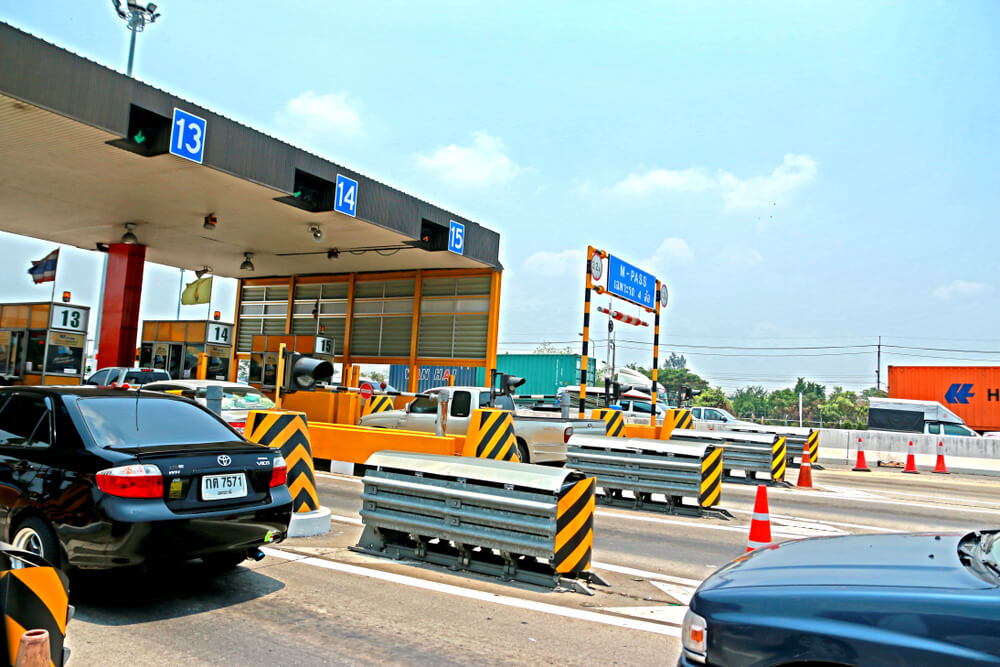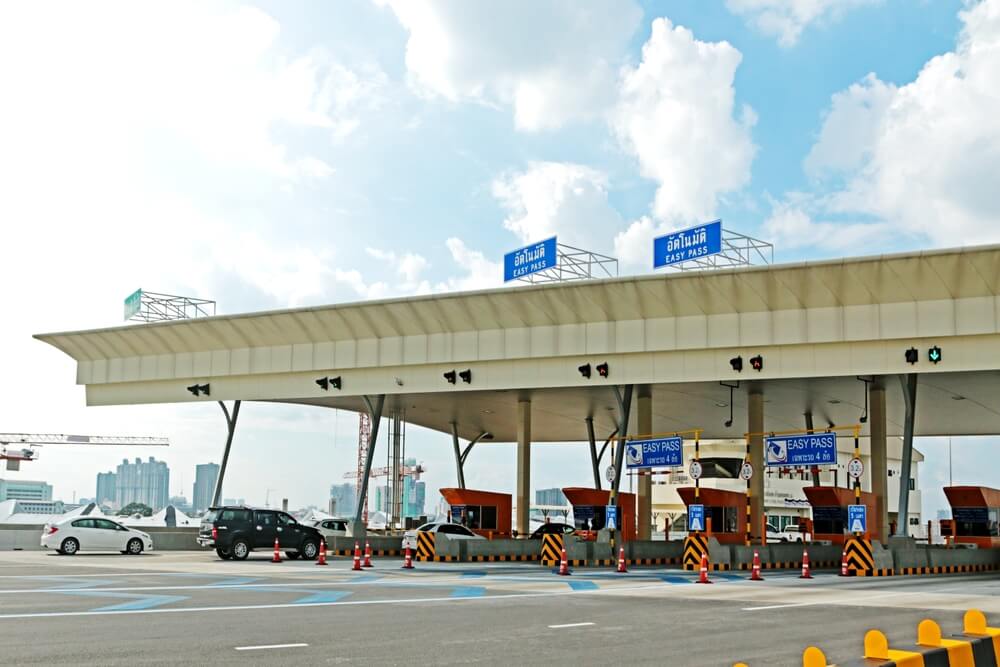Many drivers get confused about toll payments on Thailand’s roads. In 2025, most main highways will use electronic toll systems, like M-Flow and Easy Pass. This guide explains how rental car users can pay fees and follow the rules.
Read on to avoid costly mistakes while driving in Thailand.
Overview of Thailand’s Toll Road System
Thailand has a well-structured toll road system. Key highways and expressways make travel easy for drivers.
Key motorways and expressways
Motorway 7 links Bangkok to Pattaya and is popular with tourists. Motorway 9, also called Kanchanaphisek Road, forms a ring around Bangkok. Both roads are toll roads with clear signs for entry and exit points.
Expressways like the Chaloem Maha Nakhon Expressway connect city areas quickly and help drivers avoid traffic jams.
Rental car drivers need to know routes such as Burapha Withi Expressway which goes to Chonburi. Many key roadways now use electronic toll collection systems for faster travel.
The new M-Flow system reduces delays at toll booths along main expressways.
Next, discover payment methods using M-Flow and Easy Pass on these toll roads.
Electronic toll collection systems (M-Flow and Easy Pass)
M-Flow works as a barrier-free electronic toll system on selected expressways and motorways. Vehicles pass through without stopping, and cameras read licence plates. Payment is made automatically from your registered account or can be paid later online within the time limit set by M-Flow rules.
This option is popular for rented cars because drivers do not need to wait at toll booths.
Easy Pass uses an electronic tag attached inside the car’s windscreen. Toll fees get deducted from a pre-paid balance each time you drive through participating lanes. Many rental companies in Thailand offer Easy Pass devices already installed in their vehicles, making payment quick and easy for tourists using rental cars on toll roads in 2025.
Both systems help reduce traffic delays and support cashless travel across busy roadways such as Motorway No 7 or Expressway No 9 around Bangkok.

Toll-Free Periods in 2025
Toll-free periods in 2025 will allow drivers to save money during busy holidays. Drivers can enjoy free travel during the Songkran Festival and the New Year Holiday.
Songkran Festival (April 11-17, 2025)
Toll roads in Thailand will be free during the Songkran Festival from April 11 to 17, 2025. Drivers using rental cars can travel on main motorways like Motorway No.7 (Bangkok-Chonburi), Motorway No.9 (Bang Pa-in-Bang Phli), and three expressways without paying toll fees.
Songkran is a national holiday when many Thai highways are toll-free, making road trips easier for everyone.
Expect more vehicles on key routes as people travel for family gatherings and celebrations. Most rental car users enjoy this cost-saving period, but should still follow all traffic regulations and road safety rules at all times.
New Year Holiday dates also offer another toll-free period you should know about next.
New Year Holiday (December 26, 2024 – January 2, 2025)
During the New Year Holiday from 26 December 2024 to 2 January 2025, many toll roads in Thailand become free for all drivers. Motorways and expressways such as M6, M81, and sections of Motorway No.7 usually suspend toll fees during these dates.
Drivers of rental cars do not need to pay any extra charges at toll booths on these roads within this period.
Electronic systems like Easy Pass and M-Flow will also not deduct balance when using eligible routes during the holiday week. Check traffic updates before travel; busy periods may lead to delays even though there is no fee payable.
Always carry your driving licence, car insurance, and rental agreement while driving on public roadways at this time.
How to Pay Tolls on Thailand’s Roads
You can pay tolls in Thailand using the M-Flow system. This lets you drive through without stopping. You can also upgrade to Easy Pass Plus for easier payments on multiple routes.
Using M-Flow
M-Flow makes toll payments easy. It uses an electronic system to collect fees without stopping.
- Drivers must register for M-Flow online. This requires a valid driving licence and an ID card.
- Once registered, link the vehicle’s number plate to your account.
- Ensure you have funds in your M-Flow account before travelling. Keep track of your balance regularly.
- Use the dedicated M-Flow lanes at toll booths. Your car will automatically be charged as you pass through without stopping.
- If there are any issues, check the M-Flow app or website for support. They provide updates and help with problems.
M-Flow streamlines payments, helping rental car drivers avoid delays on Thailand’s roads. Next is information on upgrading to Easy Pass Plus.
Upgrading to Easy Pass Plus
Using M-Flow is a convenient way to pay tolls. Upgrading to Easy Pass Plus can make your trip even smoother.
- Easy Pass Plus allows for faster toll payments. You can drive through without stopping at the booth.
- Your vehicle must meet certain requirements for this upgrade. Only specific car types are eligible.
- Sign up online or at designated locations across Thailand. It’s easy to complete the registration process.
- Once upgraded, you receive a device that works with the electronic toll system. This makes travel more efficient on busy roads.
- Charges will be automatically deducted from your account as you pass through tolls. This saves time and hassle during your journey.
- You can check your balance and transactions online anytime, ensuring you stay informed about your toll expenses.
- Having Easy Pass Plus also offers discounts on some toll fees, making it cost-effective for frequent drivers.
Upgrade today to enjoy these benefits while driving on Thailand’s toll roads in 2025!
Tips for Rental Car Drivers
Rental car drivers should ensure their electronic payment options are active. They must also familiarise themselves with speed limits and local traffic rules before hitting the road.
Ensuring electronic payments are enabled
Electronic payments are a must for using Thailand’s toll roads. Drivers need to enable M-Flow or Easy Pass in their rental car. These systems allow quick and easy payment at toll booths.
Most rental cars come with these features already set up.
Check with the rental company before you drive off. Ask if electronic payments are enabled on your vehicle. If not, consider upgrading to Easy Pass Plus for more convenience. This system can save time and avoid delays while driving on busy roadways.
Make sure you know how to use it before hitting the road.
Understanding speed limits and road regulations
Speed limits in Thailand are important for safety. On highways, the limit is usually 90 to 120 km/h. In urban areas, it is often lower, around 50 to 80 km/h. Always check for signs indicating the specific limits.
Road regulations are strict. Use seat belts at all times and do not use mobile phones while driving. Drivers must carry a valid driving licence and car insurance documents. Fines exist for rule violations, so pay attention to traffic signs and signals when using Thailand’s toll roads.
Thailand Toll Roads In 2025
Rental car drivers will find Thailand’s toll roads easy to traverse in 2025. With the M-Flow and Easy Pass systems, paying tolls is quick and simple. Drivers should keep in mind the toll-free periods during major holidays.
Understanding local traffic rules is essential for safe travels. Enjoy your trip and drive safely!
When you need to rent a car in Thailand, SPS Car Hire is a great choice. We have lots of high-quality vehicles to rent for affordable rates. Please click on the button below to see them.


